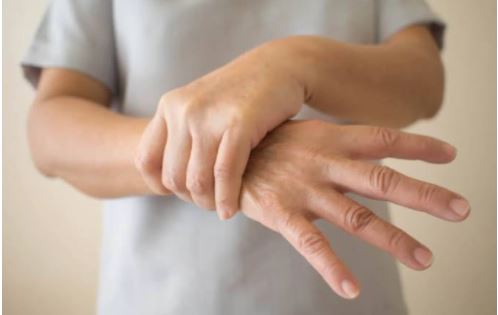Uncategorized
12 causes of shaky hands at an early age & how to reverse it

If you’ve ever wondered why your hands are shaking during a terrifying job interview, first date, or other extremely inopportune time, well, welcome to the club.
Whatever the cause, tremor is the name experts give to those times when your muscles contract rhythmically and unintentionally, and one or more of your body parts end up trembling or shaking.
It’s most likely to occur in your hands, but it can also affect your arms, head, torso, legs, and vocal cords.
According to studies, the typical age of onset is either in early 20s and 30s or in the late 60s and 70s.
Tremors in many cases are mild but can cause significant functional limitation of the activities of daily living, such as writing, eating, drinking or dressing.
What causes shaky hands?
1. Essential tremor
Essential tremor (ET) is a neurological disorder that causes your hands, head, trunk, voice or legs to shake rhythmically. It is the most common trembling disorder.
2. Parkinson’s disease
This is a disorder of the central nervous system that affects movement, often including tremors, that usually begins in a limb, often your hand or fingers. In reality, though, it’s a very rare cause of shaky hands for young people.
3. Multiple Sclerosis (MS)
MS is a disease in which the immune system eats away at the protective covering of nerves. Many people with multiple sclerosis (MS) have some form of tremor they can’t control, in different parts of their bodies, like their head, arms, or legs.
4. Alcohol withdrawal
Tremors are often a side effect of alcohol withdrawal. Alcohol shakes, also called tremors, can occur when a person who has regularly consumed heavy amounts of alcohol suddenly stops drinking.
5. Medications
A wide range of drugs can cause these tremors by affecting your nervous system and muscles. These include some anti-seizure medications, asthma drugs, antidepressants, and more.
6. B12 deficiency
Vitamin B12 is essential to maintain a healthy nervous system. A deficiency of vitamin B12, B6, or B1 could lead to the development of hand tremors.
7. Anxiety
When you’re stressed or anxious, your sympathetic nervous system releases norepinephrine, a neurotransmitter that can raise your heart rate. That, in turn, can make your hands shake in an obvious way.
8. Too much caffeine
Caffeine is a stimulant. So, the same natural chemical that helps keep you awake will also make your hands shake if you have too much.
9. Low blood sugar
Your nerves and muscles are powered by blood sugar. When they don’t get enough, they trigger your body’s natural stress response and make you shaky.
10. Lack of sleep
Sleep is a cornerstone of your health, and not getting enough can greatly affect your autonomic nervous system, which can ultimately result in more noticeable tremors.
11. Overactive thyroid
Hyperthyroidism is known as overactive thyroid. It occurs when your thyroid gland makes and releases too much thyroid hormone. As a result, the nervous stimuli become excessive, resulting in hand tremor.
12. Nerve damage
Injury, disease, or a problem with your central nervous system can also cause tremors. Your doctor will call this peripheral neuropathy. It can affect your hands and feet.
What can you do to treat shaky hands?
1. Caffeine is a stimulant. Reducing or eliminating it from your diet can help minimize hand tremors.
2. Use alcohol sparingly, if at all. Hand tremors can occur when drinking alcohol excessively as well as from alcohol withdrawal.
3. Learn to relax. Stress and anxiety tend to make tremors worse, and being relaxed may improve tremors.
4. If you have B12 deficiency, eggs, liver, milk, lean meat, fish, and chicken are natural sources of vitamin B12 that you can eat.
5. See your doctor.







